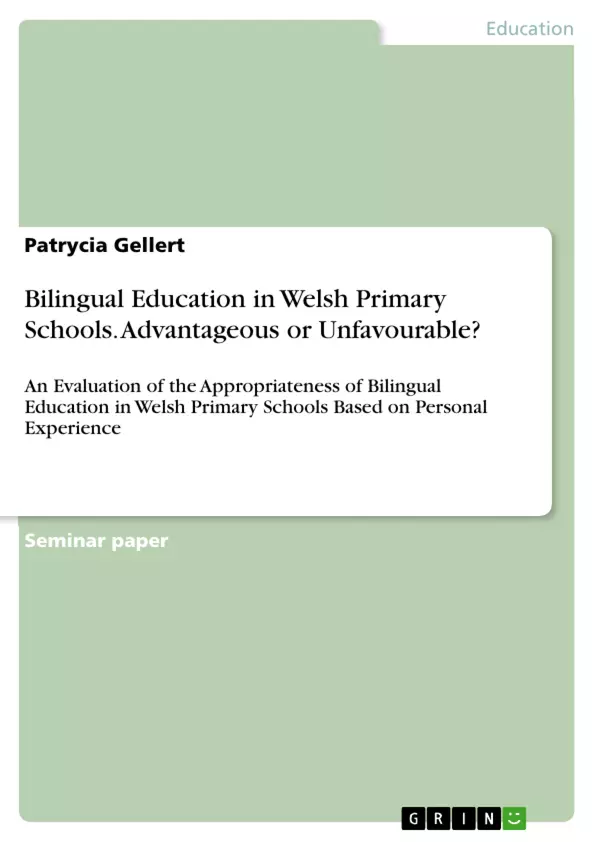This term paper concerns the advantages as well as disadvantages of bilingual education in Wales based on personal experiences I made in a primary school in South West Wales. I chose this topic because I had the great opportunity to have a direct insight into the Welsh primary school system over a certain period of time and therefore can draw on my own personal perceptions. The relevance of this subject-matter is of great importance since Wales can be considered an international character in educating through a minority language. It demonstrates that in one society two languages can co-exist, which contributes to a stronger community-spirit and pride but at the same time exhibits different opinions concerning the effectiveness of early bilingual education.
In the following I will provide a definition for bilingualism and explain the meaning of bilingual education as well as its different types, referring to Baker. Furthermore I will introduce the theoretical framework this term paper is based on, making reference to Jim Cummins’ ‘Balance Theory’, ‘Interdependence Hypothesis’ or ‘Dual Iceberg Theory’ and the ‘Thresholds Theory’. The first two mentioned theories can be classified into the idea of ‘Separate Underlying Proficiency’ and ‘Common Underlying Proficiency’, which will be elucidated later on.
Subsequently I will move on to the emergence of bilingual education in Wales, illustrating the justification of bilingual education at an early stage of life, the infant and primary school period. Ensuing I will outline my personal experiences made with primary school children in a Welsh village called Letterston, located in Pembrokeshire, from age five to eleven, stating my own observations concerning the educational situation. Ultimately I will present a conclusion relating to the advantageous or unfavourable function of bilingual education performed in Welsh primary schools based on my own experience and theoretical background.
Inhaltsverzeichnis (Table of Contents)
- Introduction
- Bilingualism and Bilingual Education
- Definition of Bilingualism
- Definition of Bilingual Education
- Types of bilingual education
- Theoretical Framework
- Bilingual Education in Wales
- Emergence of Bilingual Education in Wales
- Justification of Bilingual Education in Welsh Infant and Primary Schools
- Personal Experience in a Welsh Primary School
- Conclusion
Zielsetzung und Themenschwerpunkte (Objectives and Key Themes)
This term paper investigates the advantages and disadvantages of bilingual education in Wales, drawing on personal experiences gained in a primary school in South West Wales. The paper aims to provide a comprehensive understanding of bilingualism and bilingual education, examine the theoretical framework surrounding these concepts, and analyze the emergence and justification of bilingual education in Welsh primary schools. The paper concludes with a discussion of the author's personal experiences and observations regarding the effectiveness of bilingual education in a Welsh primary school setting.
- Definition and nuances of bilingualism
- Theoretical frameworks for understanding bilingual education
- Emergence and justification of bilingual education in Wales
- The author's personal experience in a Welsh primary school
- Evaluation of the appropriateness of bilingual education in Welsh primary schools
Zusammenfassung der Kapitel (Chapter Summaries)
- Introduction: This chapter introduces the topic of bilingual education in Wales, outlining the paper's scope and the author's personal experiences that form the basis of the study. It emphasizes the significance of Wales as an international model for educating through a minority language and explores the potential benefits and challenges of bilingual education.
- Bilingualism and Bilingual Education: This chapter defines bilingualism and explores its complexities, acknowledging the difficulty in establishing clear criteria for identifying bilingual individuals. It delves into various types of bilingual education and discusses the historical context of monolingual education, highlighting the recent shift towards bilingual educational practices.
- Theoretical Framework: This chapter introduces the theoretical framework underpinning the study, drawing on Jim Cummins' 'Balance Theory,' 'Interdependence Hypothesis,' and 'Dual Iceberg Theory,' as well as the ‘Thresholds Theory.' It discusses the concept of 'Separate Underlying Proficiency' and 'Common Underlying Proficiency' as relevant theoretical constructs.
- Bilingual Education in Wales: This chapter examines the emergence and justification of bilingual education in Wales. It explores the historical context of the movement toward bilingual education and presents arguments for its implementation in Welsh infant and primary schools.
- Personal Experience in a Welsh Primary School: This chapter provides detailed insights into the author's personal experiences in a Welsh primary school, drawing on their observations of primary school children in Letterston, Pembrokeshire. It offers a firsthand perspective on the realities of bilingual education in a Welsh primary school setting.
Schlüsselwörter (Keywords)
This term paper examines the multifaceted nature of bilingual education, focusing on key concepts such as bilingualism, bilingual education, theoretical frameworks, Welsh language, minority language education, personal experiences, and the potential benefits and challenges of bilingualism in a primary school setting. It also draws on prominent theories such as Jim Cummins' 'Balance Theory,' 'Interdependence Hypothesis,' and 'Dual Iceberg Theory,' as well as the ‘Thresholds Theory.'
Frequently Asked Questions
Why is Wales a significant model for bilingual education?
Wales is considered an international leader in educating through a minority language, demonstrating how two languages can co-exist and strengthen community spirit.
What is Jim Cummins’ 'Dual Iceberg Theory'?
This theory suggests that while two languages appear separate above the surface, they share a 'Common Underlying Proficiency' below the surface, helping students transfer skills between languages.
What are the advantages of bilingual education in primary schools?
Advantages include enhanced cognitive flexibility, better cultural awareness, and a stronger sense of identity and community pride.
What is the 'Thresholds Theory' in bilingualism?
The Thresholds Theory suggests that children must reach certain levels of linguistic competence in both languages to experience the cognitive benefits of bilingualism.
How does bilingual education affect a child's learning development?
Research and personal observations show that it can lead to high levels of proficiency in both languages without hindering general academic progress, provided the educational framework is supportive.
- Quote paper
- Patrycia Gellert (Author), 2014, Bilingual Education in Welsh Primary Schools. Advantageous or Unfavourable?, Munich, GRIN Verlag, https://www.grin.com/document/428978



